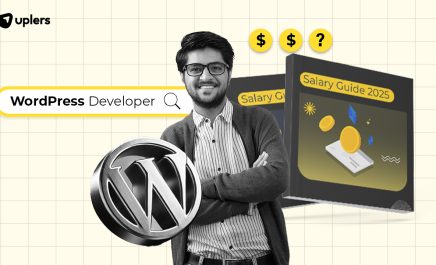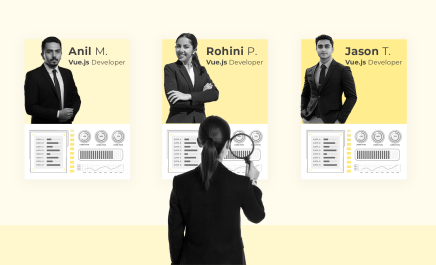How AI is Transforming The Future of Recruitment
- Raunak Jain
- January 31, 2024
- 5 Minute Read
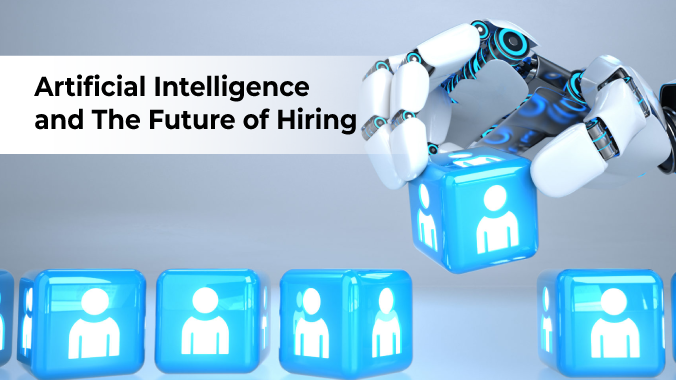
On average, companies take about 44 days to fill a job opening. The process can get even more tiring with lots of going back and forth. Businesses have figured out that if they can make this number smaller, they can save money and make their work even better. While it might sound like a big job, it’s not too hard. You can do it by using AI in recruitment to help recruiters find the right people with just a few clicks.
Recruiters go through many stages in the hiring process, from writing job descriptions to getting someone onboard. The usual way of hiring involves recruiters manually finding the right person, which can take a lot of time and sometimes get a bit frustrating. Even after going through the whole process, job seekers might accept an offer from someone else because things took too long.
That’s where AI comes in handy. AI tools use big sets of data, Machine Learning, and Virtual Assistants to go through the details candidates provide and keep track of the progress. They use different things to check if a candidate is a good fit. If the AI models are robust, these tools can even evaluate applicants based on things like how emotionally stable they are, their work ethics, and other important aspects.
Platforms like Uplers, who have adopted AI-enabled hiring, meticulously evaluates talent profiles and skills, ensuring a precise match between the right talent and the appropriate role.
Understanding the Revolution of AI in Recruitment
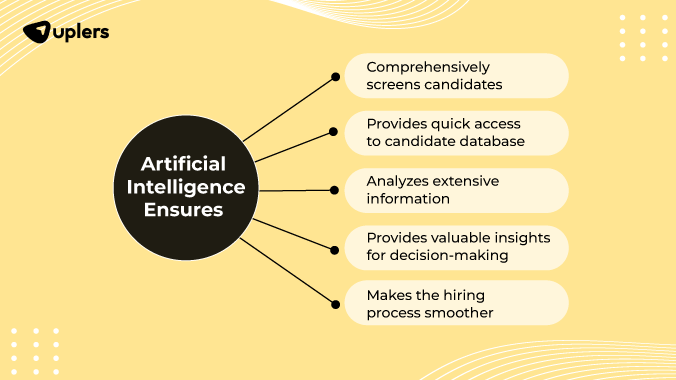
AI is a big help for recruiters to focus on what really matters: finding the right talent quickly, automating tasks that take up a lot of time, and closing job positions faster.
It can automatically screen resumes and do the first checks on candidates. This way, AI-powered systems (like Applicant Tracking Systems) make the hiring process smoother. Now, HR professionals can use their time for more important parts of finding talent.
AI has quick access to vast databases containing candidate details and job requirements. This unique capability allows AI in hiring to swiftly find excellent matches, significantly reducing the time recruiters spend searching and selecting candidates. Using AI and machine learning, it can intelligently analyze extensive information, providing recruiters with valuable insights to make informed decisions. Additionally, AI can efficiently generate reports based on data, transforming the traditional approach to hiring. This not only ensures a faster turnaround time but also enhances the overall efficiency of the recruitment process.
AI contributes to fairer hiring practices by relying on objective criteria rather than subjective opinions. Numerous AI tools in the market utilize machine learning signals to identify relevant candidates. These tools not only invite candidates for assessments but also prompt them to take tests, ensuring a comprehensive evaluation based on skills and qualifications. This approach effectively minimizes biases associated with names, gender, and education, focusing solely on a candidate’s merit and performance in assessments.
The use of machine learning signals enhances the objectivity of the hiring process, guaranteeing that each application is evaluated impartially and on the basis of relevant qualifications and test performance.
AI screening and assessment tools like Upscreen, by Uplers, claims to utilize advanced ML and AI algorithms to match resumes, analyze profiles once recruiters upload the JD, ensuring a high level of accuracy in identifying candidates best suited for the given job roles. Its integration into existing hiring processes hopes to simplify the experience for recruiters, offering ease and efficiency.
Upon reviewing the uploaded job description, Upscreen autonomously generates a tailored set of assessment questions. This AI tool then delves into a comprehensive analysis of profiles, assessments, answers, and even considers behavioral skills. It examines recorded answers, ensuring a nuanced understanding of a candidate’s response. Uspcreen assesses not just what is said but also how it is said, incorporating an evaluation of eye movement to detect any potential unethical practices. This comprehensive approach results in an objective scoring system, providing recruiters with a nuanced assessment of candidates.
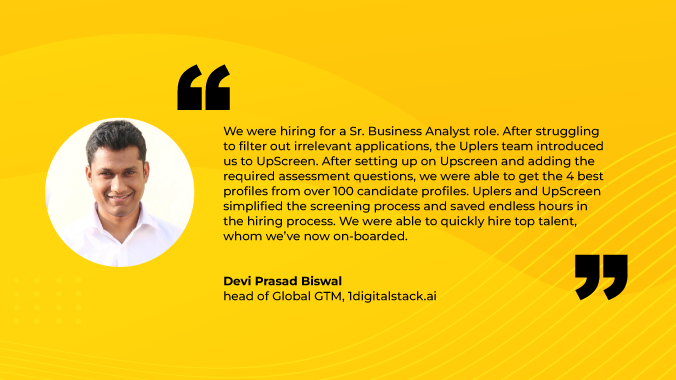
Challenges in Recruitment and AI Solutions
Resume screening:
Screening resumes takes too long. Getting the right person for a job is important as a bad hire can cost a company a lot.
Zappos CEO Tony Hsieh once said in an interview that “bad hires can cost more than $100 million.” That shows how important resume screening is.
This step is extra important because it’s the first step in hiring. Recruiters need to be really careful when picking or rejecting people. If too many resumes get filtered out, good profiles might get rejected. But if too few get filtered out, it could mean wasting time on the wrong candidates.
Using artificial intelligence in hiring is a great advantage. It can speedily look at resumes and find candidates who have the right qualifications and experience mentioned in the job description. After that, recruiters can concentrate on the most promising candidates and come up with plans to hire them.
Low hiring ratio:
The next step after finding potential candidates is to set up a call or assessment to see if they really fit the job. Even if recruiters find a good candidate in the interview, they might not offer them the job. There could be different reasons for this, such as not agreeing on pay or the candidate having other job offers, among other things.
The solution for this can be predictive hiring.
AI can look at past hiring patterns and use data from earlier hires to guess which candidates are likely to do well in a job or accept an offer. It incorporates machine learning signals from assessments, recognizing them as intent signals of a candidate’s interest. This predictive analysis helps estimate how likely it is that a candidate will get hired. Many companies are now using AI for hiring, making it much quicker to find the right people. It’s also making it better by improving the ratio of people who get job offers to those who actually accept them.
Manual work:
When evaluating candidates, recruitment teams often go back and forth between candidates and interview panels, asking and answering lots of questions. This can make the process take longer, frustrate candidates, and even make some of them give up.
Platforms like Uplers employs machine learning signals to notify and map talents who fit the role, inviting them to apply.
Final Thoughts
AI is changing how hiring works, making it better, faster, and fairer. With tools and platforms powered by AI, recruiters can screen, vet and hire candidates more precisely and quickly. Even though there are some challenges with using AI in hiring, the good things it brings are much more.
As AI keeps getting better, the future of hiring looks positive. AI in recruitment is here to make hiring simple, reliable and fast. Recruiters who welcome AI will have a big edge over those who don’t.

Thank you for submitting the details!
We will keep your information safe. Feel free to contact us with any questions at hello@uplers.com
Please check your email for next steps shared by Robert.


